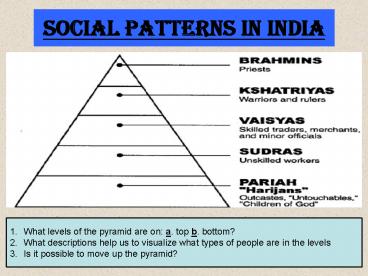Social Patterns in India - PowerPoint PPT Presentation
1 / 12
Title:
Social Patterns in India
Description:
What descriptions help us to visualize what types of people are in the levels. Is it possible to move up the pyramid? ... Bride and groom have no say in this ... – PowerPoint PPT presentation
Number of Views:27
Avg rating:3.0/5.0
Title: Social Patterns in India
1
Social Patterns in India
- What levels of the pyramid are on a. top b.
bottom? - What descriptions help us to visualize what types
of people are in the levels - Is it possible to move up the pyramid?
2
Law of Dharma/Caste SYSTEM
- Dharma- duties and obligations that a person has
- Taught to Hindu children from an early age
- Helped to ensure moral order in society
- Indians built their lives around
- family and village
- Caste System- gave people a role and rules to
live by in society
3
- When and where did the caste system start?
- What were priests called at this time?
- What language did the Muslim invaders speak?
- When did India fall under Muslim control?
- Between what time periods did Muslims enter
India? - Who did Kulothunga persecute?
4
Caste System
- Started with the Aryan civilization and the
varnas (classes) - Caste system developed over thousands of years
- Based on the idea that there are separate kinds
of humans - Higher caste people considered purer closer to
moksha - Lower caste were impure
- Divided people within each class until there were
thousands of castes and sub-castes
5
Rules of Caste System
- Rules were meant to keep people spiritually pure
- Especially for higher caste members who were the
most pure - Contact with a lower class gave you a polluted
soul - Some believed that a shadow could make a soul
impure
6
Rules of Caste System
Imagine being told who To marry and what
you Could and could not Eat
- Rules of the Caste System
- Cooking and eating habits
- Marriage
- Employment (each job had its own caste)
- Job was determined at birth
- Different gods for each caste
- Where you lived
- How you dressed
- Each caste has a council that enforces all the
rules - Ex
- A Brahman could only eat food prepared by anther
Brahman - You could only marry someone from your own caste
7
Interdependence of the Caste System
- Creates stability in the society and order
- Everyone knows what to do and why
- Different castes depended on one another
- Higher caste merchant needs a lower caste water
carrier to stay in business - This system is imbedded in the laws, customs, and
religious traditions - People accepted it as a way of life but some
fight to end it.
W-what W-would Y-you D-do ???????
8
Village Life
- Most people in India treat the village as the
basic unit of society - Village led by a Headman- respected landlord that
inherits the position from his father - Worked with a group of elders
- Organize villages for projects and work
- Like a town/borough council
9
Family Life
- Traditionally Indians favor the Joint Family
- Joint Family- includes husband, wife, their sons
with their families and unmarried daughters - Family was patriarchal (father ruled)
- Father has complete control over household
- Family interests were put ahead of individual
- Father is heaven, father is religion, the gods
are pleased by pleasing father.
What can we learn from the quote above?
10
(No Transcript)
11
Families and Marriage
- Head of the family arranged marriages to protect
and benefit family - Bride and groom have no say in this
- Marriages arranged at an early age but the
ceremony happens later - When married the girl would leave her family/home
and go to her husbands family - Might visit her own family once a year
How is this system different from the way that
marriage is in the United States
12
- Read the Up-Close story on page 192.
- Look at the picture on page 192 and read the
caption. - Discuss in your groups what you think about
arranged - marriages.































